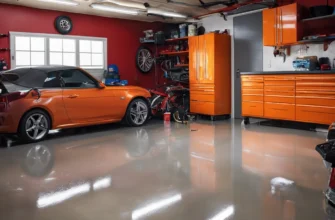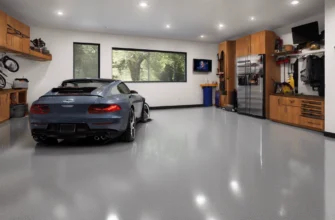- Introduction to Epoxy Flooring
- Understanding Garage Flooring Deterioration
- How Epoxy Reinforces Garage Floors
- Protection Against Cracks: The Role of Epoxy
- Resistance to Chemical and Stain Damage
- Long-term Aesthetic and Functional Benefits
- Installation Considerations for Epoxy Flooring
- Cost Analysis: Is Epoxy Worth It?
- Conclusion
Introduction to Epoxy Flooring
Epoxy flooring has become a popular choice for both residential and commercial spaces, praised for its durability and aesthetic appeal. Essentially, epoxy is made up of a combination of resin and hardener, which when mixed together create a strong adhesive that cures into a solid, resilient surface. This chemical reaction allows epoxy to bond tightly to various substrates, such as concrete, enhancing the strength and longevity of the flooring system. As a result, epoxy flooring is not only smooth and glossy but also resistant to stains, chemicals, and physical wear.
Typically, epoxy flooring is used in environments where strength and hygiene are crucial, including warehouses, factories, and medical facilities. Additionally, homeowners are increasingly choosing epoxy for garages due to its ability to withstand heavy traffic, resist moisture, and maintain an appealing appearance over time. The formulation of epoxy is versatile; it can be customized with various colors and finishes, often offering a high-gloss finish that enhances the visual appeal of the floor. This is particularly beneficial for garage spaces, which often undergo heavy usage and can suffer from wear and tear.
Implementing epoxy flooring in garages presents numerous advantages. For one, it significantly reduces the risk of cracks, which can be caused by vehicle weight, chemical spills, or fluctuating temperatures. Moreover, its seamless design eliminates grout lines or joints that are prone to damage and dirt accumulation. Additionally, the reflective quality of epoxy can improve lighting conditions in a garage, contributing to a safer and more user-friendly environment. This section lays a firm foundation for understanding how epoxy flooring can protect spaces from cracks and other forms of damage, reinforcing its growing preference in both commercial and residential applications.
Understanding Garage Flooring Deterioration
Garage floors are subjected to various stresses that can lead to significant deterioration over time. Common causes of damage include temperature fluctuations, heavy weight loads, spilled substances, and moisture accumulation, each contributing to the decline of concrete integrity. When temperatures change dramatically, the materials that make up the flooring can expand and contract. This continual movement strains the concrete, leading to cracks that can worsen over time if not addressed promptly.
In addition to temperature-induced stress, heavy weight loads present a considerable risk to garage flooring. Vehicles, tools, and storage items often exert significant pressure on the ground. If the surface is not designed to handle this weight, it can cause pitting and additional cracking, resulting in an uneven and unsafe surface.
Another contributing factor is the spillage of substances such as oil, antifreeze, and other chemicals that are commonly found in a garage environment. These substances can react with the concrete, causing it to break down and become porous. Over time, repeated exposure may lead to stains and deterioration, further contributing to the overall degradation of the garage floor.
Moisture is also a critical factor in garage floor damage. Water seeping through cracks or evaporating from the ground can foster the growth of mold and mildew, adversely affecting the concrete’s structural integrity. Furthermore, freeze-thaw cycles can exacerbate existing cracks, leading to accelerated wear and tear. Understanding these factors highlights the necessity of implementing protective measures, such as epoxy flooring, which not only enhances aesthetics but significantly reduces the risk of damage due to these common issues. This understanding provides valuable insight into why investing in durable flooring solutions is imperative for maintaining the longevity of garage spaces.
How Epoxy Reinforces Garage Floors
Epoxy, a durable and versatile material, plays a pivotal role in reinforcing garage floors, transforming them into resilient surfaces capable of withstanding heavy loads and impacts. The strength of epoxy flooring derives from its unique chemical composition and bonding properties, which enhance the garage floor’s overall durability. When epoxy is applied, it undergoes a curing process that is characterized by a series of chemical reactions. During this process, the resin and hardener interact, forming a solid, cohesive material that adheres firmly to the concrete substrate. This chemical bonding creates a robust interlocking network that greatly increases the floor’s tensile strength.
The thickness of the epoxy application is another crucial factor that contributes to the reinforcement of garage floors. Typically, epoxy coatings are applied in layers ranging from 1/16 inch to 1/4 inch in thickness. This added thickness not only provides a protective shield against various types of damage—such as cracking, chipping, or staining—but also enhances the load-bearing capacity of the garage floor. By distributing weight across a wider area, epoxy flooring minimizes the concentration of stress points, thus reducing the likelihood of cracks and surface imperfections over time.
Furthermore, epoxy flooring displays superior resistance to a variety of environmental factors, including moisture, chemicals, and temperature fluctuations. This inherent resistance is vital in a garage setting, where spills and exposure to harsh substances are common. By effectively sealing the floor against moisture penetration and chemical reactions, epoxy coatings safeguard against potential deterioration. The combination of robust chemical bonding, optimal thickness, and resistance to environmental stressors collectively ensures that an epoxy-coated garage floor remains structurally sound and visually appealing for years. Thus, investing in an epoxy flooring solution can significantly prolong the lifespan of garage surfaces while maintaining their functional integrity.
Protection Against Cracks: The Role of Epoxy
Epoxy flooring serves as a robust barrier that effectively prevents cracks and other forms of damage, particularly in high-stress environments such as garages. This protective layer is crucial for offering resilience against various environmental pressures, which can lead to cracking in traditional flooring materials. One of the primary benefits of epoxy is its inherent flexibility, which allows it to accommodate the natural expansion and contraction of the underlying concrete due to temperature fluctuations. This adaptability significantly reduces the chances of cracks forming, thereby extending the lifespan of the flooring.
Moreover, epoxy flooring possesses a notable ability to withstand thermal expansion. As temperatures rise, materials typically expand; however, epoxy’s composition allows it to absorb and return to its original form without compromising its structural integrity. This quality is particularly beneficial in regions with extreme temperature variations, as it helps maintain a stable and durable flooring surface that is less susceptible to damage.
Equally important is epoxy’s capacity to distribute weight evenly across the entire floor surface. When weight is concentrated in specific areas, the risk for cracking increases significantly. However, the even distribution of pressure by epoxy minimizes stress concentrations, acting as an effective shock absorber. Consequently, vehicles and heavy equipment can be used without the fear of causing damage to the flooring. Epoxy flooring not only provides excellent traction for vehicles but also helps in maintaining a dependable surface, ensuring that cracks and other structural issues are significantly less likely to occur.
Utilizing epoxy flooring in garages presents an opportunity to enhance resilience against cracks and prolong overall durability, making it an ideal choice for those seeking reliable, long-lasting protection for their flooring surfaces.
Resistance to Chemical and Stain Damage
One of the standout features of epoxy flooring is its remarkable resistance to chemical and stain damage, making it an excellent choice for garages where volatile substances are frequently present. Oils, greases, antifreezes, and various automotive fluids are common in typical garage settings, and without proper flooring, these substances can lead to significant degradation, staining, and deterioration. Epoxy flooring acts as a robust barrier that is impervious to such agents, ensuring the underlying concrete remains protected.
The unique chemical composition of epoxy creates a surface that not only resists absorption but also facilitates easy cleanup. Unlike traditional concrete flooring, which can be highly porous, epoxy forms a smooth, non-porous surface that prevents fluids from penetrating. If any spills do occur, they can be wiped up quickly, minimizing the risk of staining or permanent damage. This ease of maintenance is essential for homeowners who wish to maintain a tidy and functional garage environment.
Moreover, the resilience of epoxy flooring extends beyond its immediate protective qualities. Over time, the durability provided by this flooring solution significantly reduces the wear and tear often associated with harsh chemicals and regular foot or vehicle traffic. This means that not only is the aesthetic appeal of the garage preserved, but it also considerably extends the life of the garage floor itself. Additionally, since epoxy is resistant to many types of surface damage, it supports the longevity of the flooring investment, allowing homeowners to save on future replacements and repairs.
In conclusion, the resistance of epoxy flooring to chemical and stain damage presents numerous benefits for garage spaces. By providing a protective barrier against common garage-related substances, epoxy not only safeguards the integrity of the concrete but also simplifies maintenance and enhances the longevity of the garage floor.
Long-term Aesthetic and Functional Benefits
Epoxy flooring offers a range of long-term aesthetic and functional benefits, making it a popular choice for garage spaces. One of the most significant advantages of epoxy is its customizable options. Homeowners can choose from a vast array of colors, patterns, and finishes, allowing for total personal expression. Whether one prefers a sleek, shiny look or a more textured finish, these options can enhance the overall appearance of the garage, creating a visually appealing environment.
In addition to its aesthetic appeal, epoxy flooring provides excellent functional attributes. One of its standout features is its ease of cleaning. The smooth surface of epoxy resists dirt and grime buildup, allowing for quick and effortless maintenance. A simple sweep or mop is often sufficient to maintain its pristine condition. Furthermore, epoxy is resistant to common spills that occur in garages, including oil and chemicals. This characteristic ensures that the flooring remains intact and free from stains, contributing to its long-term durability.
Another advantage of epoxy flooring is its resistance to wear and tear. The strong and durable nature of epoxy makes it highly resistant to chipping, cracking, and heavy impacts, which are common in a garage environment. This durability not only extends the lifespan of the flooring but also reduces the need for frequent replacements or repairs, ultimately saving homeowners time and money in the long run. Additionally, epoxy flooring has a seamless design, which minimizes the chances of dust and debris accumulating in cracks, further enhancing cleanliness and longevity.
In conclusion, epoxy flooring contributes significantly to both the aesthetic and functional aspects of a garage. With its customizable designs, ease of maintenance, and impressive durability, it proves to be a worthwhile investment for homeowners looking to improve their garage spaces.
Installation Considerations for Epoxy Flooring
Before proceeding with the installation of epoxy flooring in your garage, homeowners should consider several critical factors to ensure a successful and long-lasting outcome. One of the most important steps in the epoxy flooring installation process is thorough surface preparation. The existing garage floor must be free of debris, oils, and previous coatings that could undermine the adhesion of the epoxy. This may involve cleaning the surface, filling in any cracks, and sometimes even grinding or sanding it to create a smooth, porous surface. Proper preparation is key as it significantly contributes to the durability and longevity of the epoxy finish.
Another significant consideration is whether to hire professional installers or to take on the DIY route. While epoxy flooring can be a manageable project for some, the intricacies involved often lead to better outcomes when handled by professionals. Experienced installers possess the expertise and tools necessary to tackle potential challenges, such as achieving the right temperature and humidity levels during application, avoiding air bubbles, and ensuring proper curing times. Additionally, hiring professionals can save time and provide peace of mind, given their capacity to foresee and mitigate potential issues that may arise during installation.
Furthermore, it’s important to contemplate the timeline associated with the installation process. Depending on the size of the garage and the type of epoxy system being applied, installation can take anywhere from a single day to several days, especially when accounting for surface preparation and curing times. Homeowners should plan accordingly, as the garage may be temporarily unusable post-installation until the epoxy has fully cured. Understanding these elements and preparing adequately can help ensure that the installation of epoxy flooring in your garage meets both your aesthetic and functional needs.
Cost Analysis: Is Epoxy Worth It?
When considering the installation of epoxy flooring in your garage, it is essential to conduct a thorough cost analysis. The initial investment for epoxy flooring can vary significantly depending on factors such as the size of the garage, the quality of the epoxy used, and labor costs. On average, homeowners can expect to spend between $3 to $12 per square foot for epoxy flooring installation. While this may seem like a considerable initial expense, it is crucial to evaluate the long-term benefits that this durable flooring option provides.
One of the main advantages of epoxy flooring is its exceptional resistance to damage. Traditional flooring materials, such as concrete, are prone to cracks, stains, and general wear over time. In contrast, epoxy can withstand harsh chemicals, heavy impacts, and considerable temperature fluctuations, which often leads to lower repair costs over the years. By investing in epoxy flooring, homeowners can save on maintenance expenses associated with more vulnerable flooring options, making it a financially sound choice in the long run.
Furthermore, epoxy flooring enhances the aesthetic appeal of a garage. Available in a variety of colors and finishes, it can transform an ordinary garage into a visually appealing space. This increase in aesthetic value can also contribute to the property’s overall marketability, especially for those looking to sell in the future. A well-maintained, stylish garage can significantly enhance the perceived value of the home, providing a return on investment that exceeds the initial cost of installation.
In conclusion, while the upfront costs of installing epoxy flooring may appear substantial, the long-term savings on repairs and maintenance, along with the aesthetic appeal and increased property value, indicate that epoxy flooring is a worthy investment. The durability and resilience it offers make it an intelligent choice for homeowners looking to protect their garages effectively.
Conclusion
In conclusion, the utilization of epoxy flooring presents a multitude of benefits that significantly enhance the durability and longevity of garage spaces. This high-performance flooring option effectively addresses common issues such as cracks, stains, and abrasions that typically afflict concrete surfaces. By forming a resilient barrier against chemicals, moisture, and heavy traffic, epoxy coatings provide far greater protection compared to traditional concrete floors.
Throughout the discussion, we examined the various properties that make epoxy flooring an optimal choice for garages. Its resistance to impact, ease of maintenance, and aesthetic versatility improve not only the functionality of the space but also contribute to an appealing environment. Furthermore, the installation of epoxy can be a cost-effective solution, limiting the need for frequent repairs or replacements due to damage over time.
Choosing epoxy flooring is not merely about aesthetics; it is a strategic investment aimed at prolonging the life of your garage. As epoxies form strong bonds with concrete, they reduce the likelihood of cracks emerging under stress, thereby directly addressing prevalent concerns of homeowners regarding garage maintenance. The non-slip surface of epoxy also promotes safety, making your garage a secure area for both vehicles and pedestrian traffic.
Considering these numerous advantages, it is highly recommended to weigh the option of installing epoxy flooring in your garage. If you are contemplating this upgrade, seeking professional guidance can ensure that you receive the best installation practices tailored to your specific needs. Ultimately, the lasting impact of epoxy on garage durability cannot be overstated, urging homeowners to embrace this innovative solution for a resilient and functional garage space.








